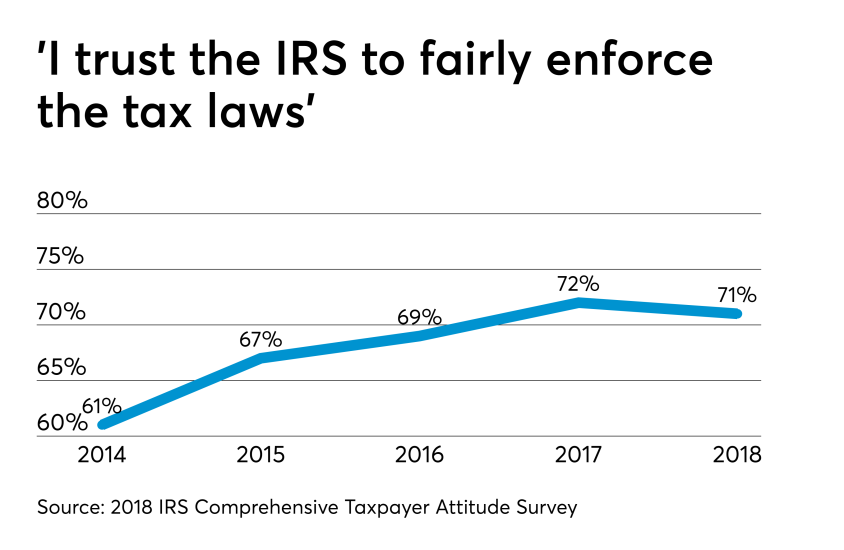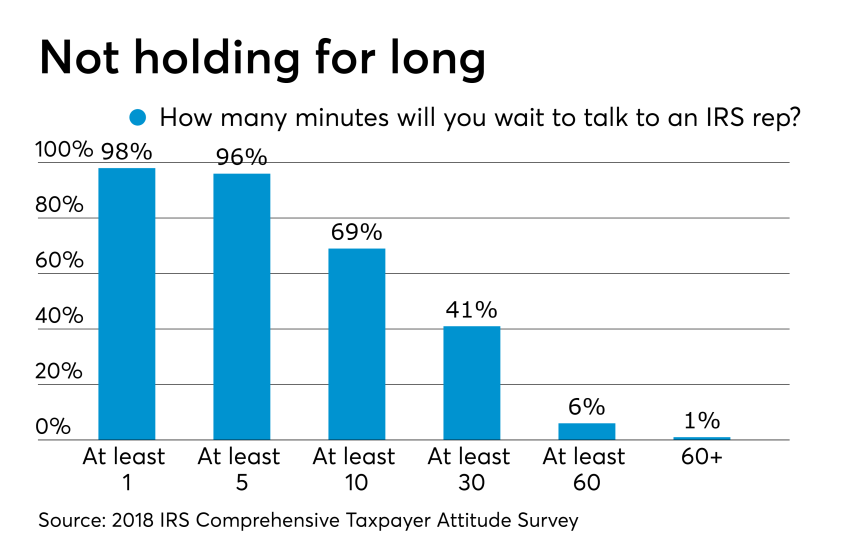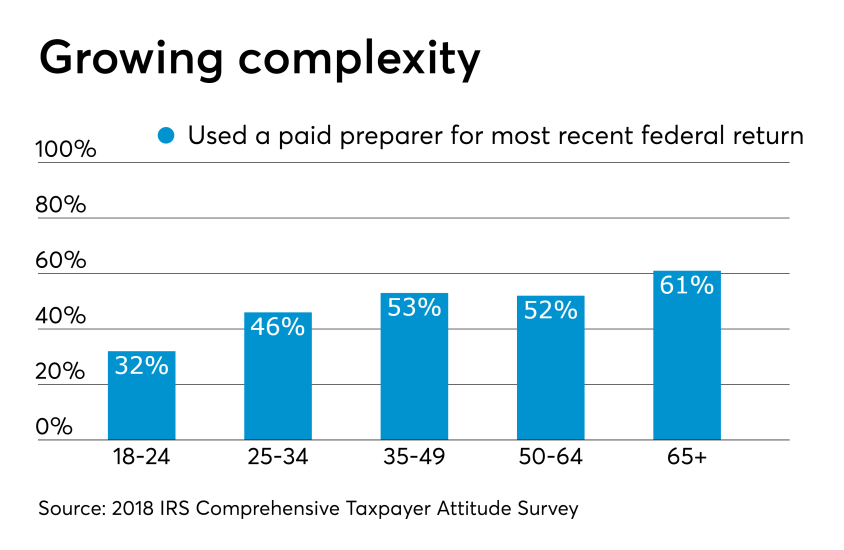What Taxpayers Really
Think


Jim Buttonow, CPA CITP
Updated on: June 11, 2019
For the last two years, the Internal Revenue Service has surveyed taxpayers to find out what makes them comply with their tax obligations. The study – called the “Comprehensive Taxpayer Attitude Survey” is released with the annual IRS Data Book, a compendium of data related to tax filings and IRS enforcement and service activity. Prior to 2017, the last survey and study of taxpayer’s attitudes was from the IRS Oversight Board in 2014.
The Attitude Survey offers some interesting understandings on how taxpayers view the IRS and fellow taxpayers. It provides many findings about taxpayer needs and preferences – and what taxpayers value. Tax professionals can use this information to gain knowledge about what clients want and how they like to be served.
Here are seven insights from the survey.

1. Our voluntary tax system is still intact
Taxpayers want to do the right thing. This is good news for the US Treasury. The Survey showed that 85 percent of all taxpayers think it is not acceptable at all to cheat on their taxes. This number is fairly close to the voluntary compliance rate (VCR) of 81.7 percent in the last IRS tax gap study. The VCR measures how much of the nation’s taxes are paid voluntarily by taxpayers. Now 81.7 percent may seem low — but is higher than most countries in the world with a voluntary tax system (refer to the Greek and Russian economies with large portions of their economies outside the taxing system).
An interesting finding in the survey was that only 50 percent of Americans mostly or completely agree that it was their responsibility to report tax cheaters. Taxpayers with lower incomes also felt more strongly about making sure taxpayers paid their “fair amount” of taxes. Taxpayers felt strongly that the IRS should pursue corporations and high-income taxpayers to pay their taxes.
Tax pros — our clients are motivated to get it right. They feel obligated to do the right thing – and that means that they will need your help and assurance that they are in good standing with the IRS.

2. Taxpayers are generally OK with the IRS
Also, more Americans thought that the IRS had a good balance of customer service versus enforcement and 58 percent of all taxpayers thought the IRS should get more funding from Congress to enforce the tax laws. Last year, only 56 percent of taxpayers believed the IRS needed more money. Taxpayers mostly want the extra funding to go to provide more phone and personal assistance to taxpayers.
Taxpayers generally trust the IRS to protect their tax account records from cyber criminals. Seventy-two percent of all those polled stated are confident in the IRS’s cyber protections.
Tax pros need not worry that the IRS will be replacing them — see No. 5 below. The person that they value the most is not the IRS — it is their tax professional.

3. Most people feel compelled to pay taxes — but they know there is a ‘stick’ if they don’t
However, taxpayers still think big brother is watching them — through information statements like W-2s and 1099s. IRS compliance enforcement and audits are still a mystery to most — and there is real fear of an audit that drives taxpayer compliance.
Tax pros are expected to make sure that the return is accurate, and it matches the IRS third-party information statements (W-2s, 1099s). If a discrepancy exists, taxpayer “fear” is real – and tax pros should be prepared to help.

4. Taxpayers prefer not to visit the IRS
What everyone agrees on is that waiting more than 5 minutes to get ahold of the IRS is not acceptable. The IRS is sure to feel the pressure to accelerate its digital service solutions to create phone capacity and to meet modern service preferences. The IRS is currently undergoing a six-year initiative to modernize IRS systems and customer service platforms. The survey shows that taxpayers are already screaming for these solutions.
Tax pros- multi-channel customer service is critical. Your clients want you to be responsive. Likely communicating with younger clients via email and your website is preferred. However, older clients still expect you to pick up the phone and not to leave them waiting on hold.

5. Tax professionals are valuable resources – and the IRS should be able to regulate them
The survey also shows taxpayers value an independent interpretation of the tax law and how it impacts them. Reference materials from non-IRS sources are the preferred choice for taxpayers to get information about their taxes.
But taxpayers want comfort that their tax pro is doing a good job. Over 90 percent of all taxpayers believe it is somewhat or very important that tax preparers meet competency and ethical standards to practice. This statistic has long been the IRS’s fuel for tax preparer regulation.
For tax pros, your visible credentials are important here. Taxpayers like accountability. Your website and communications with your clients should be informative and display your expertise.

6. The older you are, the more you need a tax pro
Younger taxpayers tend to self-file more. But as life gets more complex, taxes get more complicated. Tax pros need to be in a position to offer advice to new clients on changing life events that trigger the younger self-filer to engage with a tax pro. Many tax firms’ websites greet these new clients with information about how the firm can help with new life events, such as starting a business.

7. 41% of taxpayers still must deal with the IRS outside of filing a tax return
What does this mean? For 41 percent of taxpayers, taxes don’t end at filing.
Out of the over 150 million individual taxpayers, there are millions with a tax issue, problem or notice. Some examples: 27 million taxpayers each year have a penalty; over 15 million taxpayers owe the IRS back taxes; 3 million taxpayers received a CP2000 underreporter matching notice in 2018; almost 1 million got audited in 2018. The list goes on … .
One other data point: 79 percent of the taxpayers who interact with the IRS outside of filing a return are satisfied with their service. Tax pros — you can do better than 79 percent and be in a position to advocate for your client.
Takeaways
Younger taxpayers are making more demands of their service providers. The generational shift toward technology is upon us – and clients want the quick, responsive answers for their taxes that they commonly get with other financial products and services.
Lastly, taxpayers are good people and they want to remain in good standing with the IRS. They want to comply but often fear the IRS should they need to contact them. Tax professionals need to be there year-round for the 2 out of 5 clients who must interact with the IRS outside of a tax return. The equation: Client retention is being there when you client needs you.
Tax pros, the future of your business looks bright. Despite all the talk about simplification, the modern tax pro is still the preferred choice for many taxpayers.
